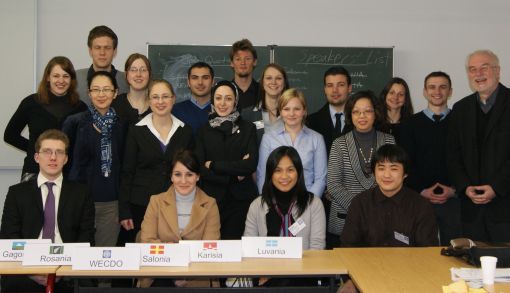Whether it’s Southern Africa, the Middle East or Afghanistan – many regions of the world are beset by political or military conflict today. The Master’s Programme “Peace and Conflict Studies” at the University of Magdeburg is focused on easing such tensions.
The programme rigorously explores the challenges of conflict resolution and peacemaking, and takes an interdisciplinary approach to addressing these challenges. “No conflict can be understood without first examining all dimensions of the problem,” says programme director Professor Anna Geis. This is why the programme’s seminars and lectures are not limited to the fields of political science and sociology – where the programme is housed – but also integrate neighbouring disciplines such as history, philosophy and linguistics. The students themselves also bring diverse academic and professional backgrounds, which allows for a more comprehensive analysis of the causes and dynamics behind conflict. “Taken together, my colleagues in the programme bring an array of different perspectives and approaches – from politics, the communications sciences, sociology and international relations – so we can learn a lot from each other,” says student Salomé Bravo from Ecuador.

The students engage in simulation games to resolve either fictional or real conflicts © Peace and Conflict studies at University of Magdeburg
Academic theory and reality
The theoretical knowledge that students acquire in the programme’s lectures and seminars is put to the practical test. They engage in simulation games, for example, and conduct negotiations to resolve either fictional or real conflicts. “The students are assigned certain positions, provided with the necessary background information, and are then asked to present their position in the mock negotiations,” explain Geis. The aim is to uncover the many different aspects of a conflict. In a dispute over river rights, for example, negotiators must consider a range of questions: What are the geologic conditions? Why, exactly, are the parties in conflict? What are the possible solutions and perspectives for the future? The students not only apply their newly acquired knowledge, but also experience first-hand how settlement agreements are often the result of a drawn-out and painstaking process of compromise.
The students themselves add authenticity to the simulations. “Many of our students come from emerging and developing countries, and several from regions currently experiencing acute crises, so their experience adds real value to the discussion,” says Geis. In this way, abstract theories and seemingly far-away conflicts become tangible. At the same time, students from conflict and/or transition regions learn to better understand the situation in their home countries. “I was particularly interested in the ‘Global Society and Transformation’ module because I come from a post-Soviet country currently in a transition phase,” reports Leyla Djafarova from Uzbekistan.
Future rich in opportunity
By bringing together academic learning and practical application, the “Peace and Conflict Studies” programme opens the door to numerous career opportunities in academics, politics or journalism. Antoine Sanga from Burkina Faso, who previously worked as a mediator, now wants to use his Master’s degree from the University of Magdeburg to move into teaching: “In Germany I’m gaining theoretical knowledge that will give my career a push in the right direction. “
Alumni from southern Africa can also expect a push in the right direction when they get together with political decision-makers to discuss the issue of forced migration – an event hosted by the Master’s programme.





